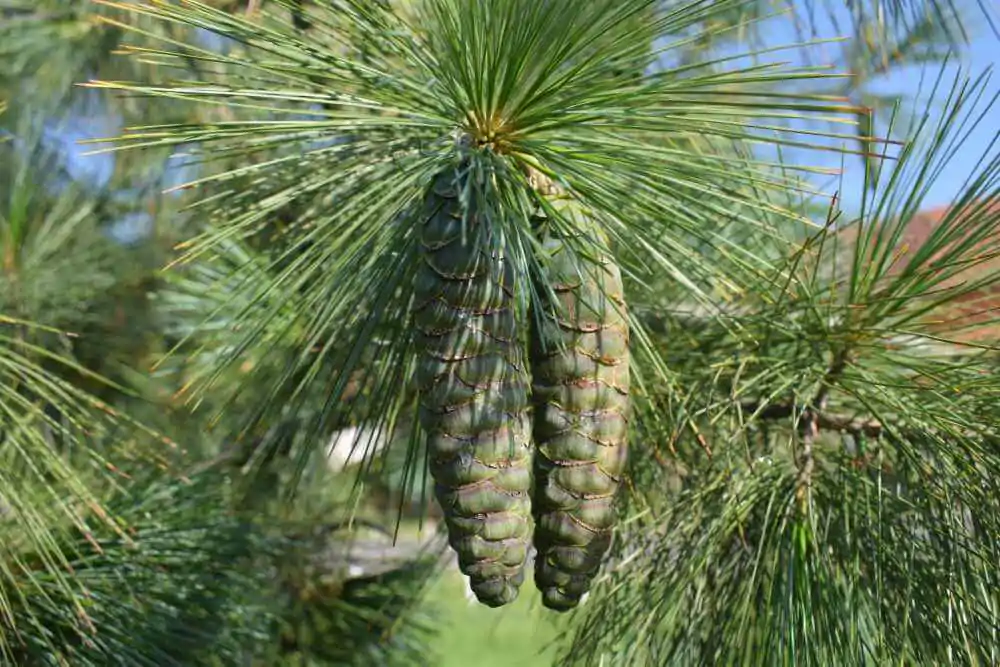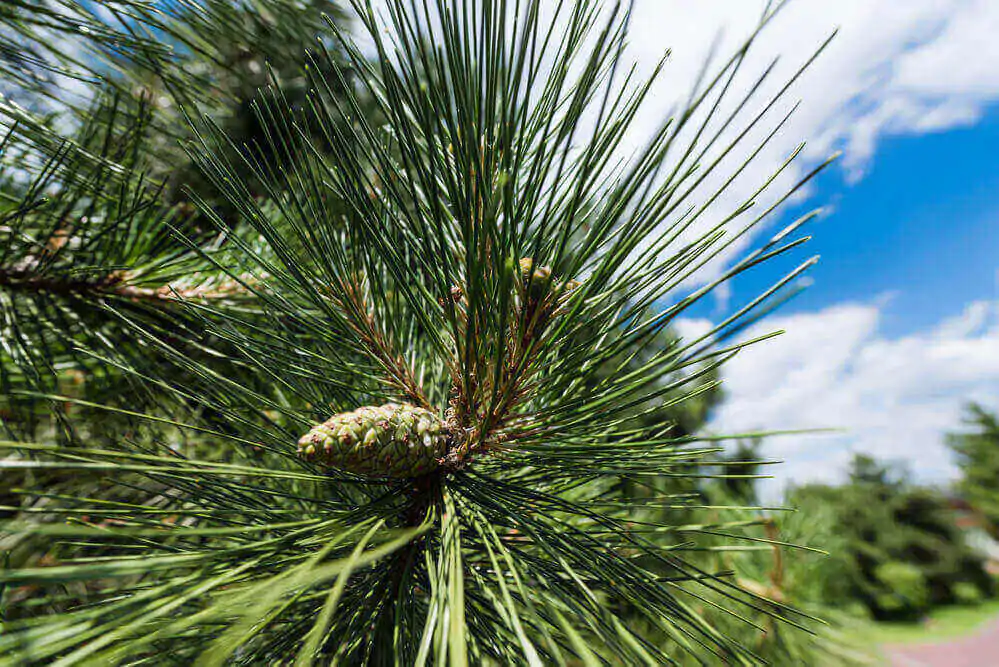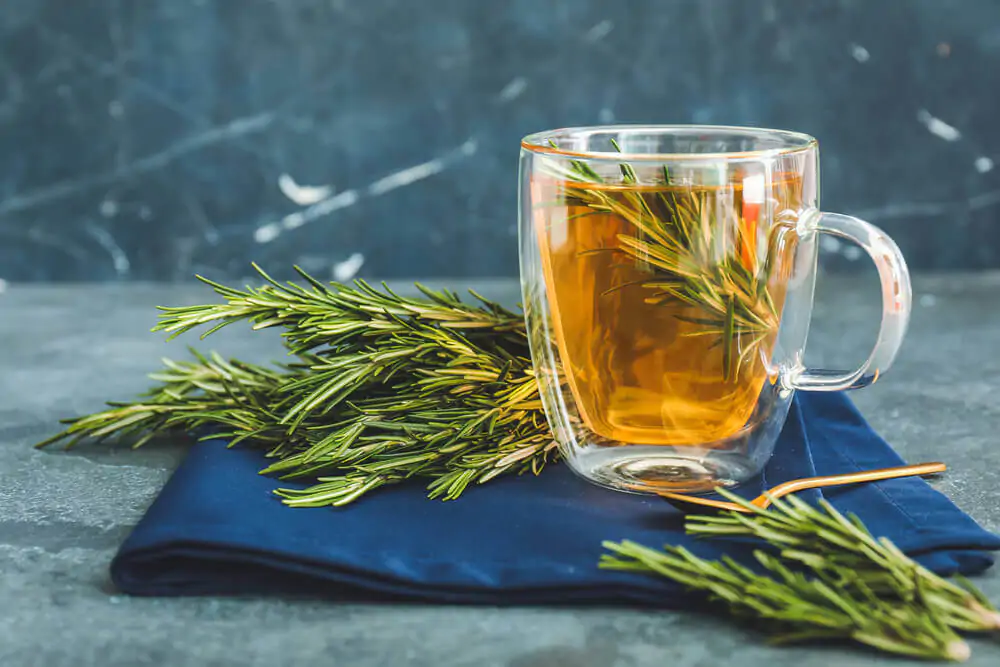Pine needle tea is made by soaking pine needles in hot water. During this article, we answer just what is pine needle tea good for and show you how to make it.

To the 159 million American tea drinkers out there, have you ever thought about making your tea from scratch? A fun aspect of being a tea lover is that it’s easy to create personal tea or herbal blends. On top of that, you get to experiment with flavors and find the ones that you enjoy the most.
An exciting and easily accessible type of tea you should try is pine needle tea. Loaded with health benefits and smelling like Christmas, pine needles are available during winter when there is no other greenery to be found.
Of course, you should only forage them if you know what you are looking for. Otherwise, it can be a dangerous experience as some pine needles are poisonous.
However, when you do make the right type of pine needle herbal tea, you can benefit from a whole heap of positive side effects.
Before we give you those details by taking a deep dive into what pine needle tea is good for, let’s first learn a little more about the drink. You might also be wondering, what is sage tea?
What Is Pine Needle Tea?
As the name suggests, pine needle tea is a beverage made by brewing the needles of Pinus strobus or the eastern white pine. It’s also known as northern white pine, Weymouth pine, soft pine, and white pine.
Most pine needle tea recipes contain just a few simple ingredients, with the most common ones featuring just hot water and the needles themselves. Of course, you can add a sweetener, such as honey or sugar if you want to take away some of the bites from the taste.
You need to be careful when choosing your needles. There are more than a hundred varieties of pine trees in North America alone, with many of them containing toxins.
There are approximately 20 pine needle trees known to be toxic, so make sure to research thoroughly before you go foraging. These conifers include common juniper, common yew, Ponderosa pine, Lodgepole or Shore pine, Monterey cypress, Norfolk Island pine, and Australian pine. Thus, it goes without saying that you should not make tea with the needles from those trees.
How Does Pine Needle Tea Taste?
The tea is aromatic with a subtle piney, resinous, and astringent taste. It has undertones akin to peppermint tea and very slight citrus notes, like hoppy beer. The color is transparent with a slightly green hue.
It’s a great tea to have around the holiday season, as its aroma is incredibly festive.
People from Scandinavian countries have consumed pine needle tea for millennia thanks to its medicinal properties. However, its first use dates back to the 16th century, when it helped treat scurvy in sailors. Because of its perceived vitamin C content, today it’s most commonly associated with curing sore throats and other minor ailments.
Pine needle tea is completely free from caffeine. However, this doesn’t mean you get a free pass to drink it if you are pregnant or breastfeeding. In those cases, either avoid this tea altogether or run it by your doctor first.
Can You Forage Pine Needles Yourself?
If you do decide to collect your own needles, you should only forage white pine needles with an expert who can identify the different pine trees for you. As we have already mentioned, there is an abundance of pine needles that are toxic for humans.
Experts will tell you that the best time to forage is in early spring when you can easily smell the fragrant pine sap and collect young, light green needles. You can also go in the winter, but you won’t find young needles. Teas made from older pine needles tend to have a stronger and more bitter taste.

The first and most important step of foraging is identifying the tree. Next, you should ensure the area doesn’t get treated with chemicals or pesticides. You can harvest pollutant-free pine needles by foraging further away from roadways and farmer’s fields.
Finally, never overharvest pine needles from one tree or one area only. Don’t forget to bring a sharp pair of scissors to snip branches with thinner needle clusters. You may not have access to or time to forage pine needles to make tea.
Fortunately, you can buy commercial pine needle tea online. If you prefer wild-foraged pine needle tea, consider Pine Needle Tea by Go Natural. There are plenty of other options available on Amazon too.
What Are The Benefits Of Pine Needle Tea?
Pine needle tea is rich in vitamins, antioxidants, and minerals. Other constituents found in pine needle tea include:
- Alpha-Pinene
- Beta-Pinene
- Beta-Phellandrene
- Vitamin C
- D-Limonene
- Germacrene D
- 3-Carene
- Caryophyllene
- Vitamin A
- Essential Oils
Because of its nutritional makeup, it is unsurprising to see that pine needle tea has a number of health benefits and is commonly used as a holistic option to cure various ailments. Below are just some of the health benefits of pine needle tea.
1. Boosts The Immune System
Pine needle tea contains lots of Vitamin C, which helps boost your immune system to function at its best in fighting infection and enfeebling diseases. The exact amount varies from needle to needle, but pine needle tea is suspected to contain four to five times more Vitamin C when compared to common sources such as orange juice, although there is little research to prove this. Despite the lack of authenticating data, the drink is traditionally used to remedy scurvy due to Vitamin C deficiency and antidotical evidence has shown it to actually work for cough symptoms too.
2. Improves Eyesight
Pine needle tea is also thought to be a rich source of Vitamin A, which can improve your eyesight. It also helps build your body’s defense system and is essential for bone health. We are sure you will agree that the more you read about this tea, the more it seems like a super-food.
This vitamin can also help treat acne. Having enough Vitamins A and C also results in healthier hair growth and stronger nails. That is why pine needle tea is often included as a holistic treatment to cure issues with these symptoms.
3. Offers A Sense Of Well-being
As mentioned earlier, pine needle tea contains lots of Vitamin C, which supports brain health. Studies show that people who drink pine needle tea feel an elevated mood and reduced stress.
If you don’t have access to fresh pines, aromatherapists suggest placing a few drops of evergreen oil on a tissue or your pillow and inhaling slowly. The aroma is similar to what you’ll smell coming from your cup of herbal pine needle tea. Thus, it’s clear that the scent of fresh pine needles can be relaxing for some people.
4. Rich In Antioxidants
Again, Vitamin C comes into play – it helps combat oxidative stress and neutralizes free radicals. Free radicals can change DNA, which leads to diseases like cancer, heart disease, and painful arthritis.
There is also a study showing that pine needle tea can help to slow the aging process. Aging can be accelerated by free radical damage.
Vitamin C is an essential daily nutrient that helps repair damaged tissues in every part of the body. It repairs collagen, ligaments, and blood vessels and helps your body absorb iron from plant-based foods. Water extracted from the needles was found to contain high levels of antioxidants and properties protective of DNA.
5. Strengthens Heart Health
Drinking pine needle tea might benefit heart health. Studies show that it can ward against LDL oxidation. This condition is bad for cardiovascular health.
Pine needles may be anti-inflammatory too. This might minimize heart damage because of pollution and other factors. Of course, if you are having issues with your heart, you should obviously contact your doctor rather than having a cup of pine needle tea.
However, there is little doubt that it can assist you if your goal is to have a healthy lifestyle and do everything within your power to avoid heart issues.
Pine Needle Tea Side Effects

We cannot say this enough – do not gather pine needles for tea without expert help! The USDA Agricultural Research Service revealed that the needles coming from ponderosa pine can cause miscarriage when cattle consume them. Thus, it also should be repeated that if you are pregnant, then it may not be a good choice of tea for you.
There are not too many studies or reports about the potential side effects that come from drinking pine needle tea, but some side effects we have seen reported are:
- Diarrhea and vomiting
- Nausea
- Feeling dizzy
- Headaches
The pine needle tea benefits are many. However, it’s always advised to err on the side of caution and avoid pine needle tea if you have a medical condition that makes you vulnerable. People with allergies may also have a reaction to pine.
Pine oil released during the brewing of pine needle tea can cause skin inflammation for some people.
A good option is to initially drink small servings and see how you feel. If there are any issues, you should immediately stop. However, if you have no adverse reactions to pine needle tea, then you can continue consuming it.
How To Make Pine Needle Tea
It is not hard to brew pine needle tea the way commercial distributors do. Soak the freshly harvested pine needles for 24 hours. Next, rinse, clean, and trim off their sharp tips.
This is a very important part of the process as it gets rid of any excess dirt or residue.
Spread the needles to needles dry in a shaded area. Afterward, you’re ready to brew and store them. You might also be interested in our guide on cold brewing chai tea.
Or you can use this method:
Step 1: Clean The Braches
Clean the branches at home thoroughly with water. As these are harvested from the wild, it is important that you are thorough. After all, there may be animal excrement on the branches.
Then you can remove the pine needles by plucking them. Next, cut the needles into smaller pieces.
You can release their piney flavor by gently mashing them with a mortar and pestle. At this point, it’s worth keeping an eye out to see if you have any adverse reactions to the needles touching your skin.
Step 2: Add The Water
Add two tablespoons of pine needles for every cup of boiling water and let steep for 10-15 minutes. You should be getting the beautiful aroma of the needles at this stage.
Step 3: Serve
Strain the needles out and enjoy. Feel free to add a sweetener like honey as you like.
